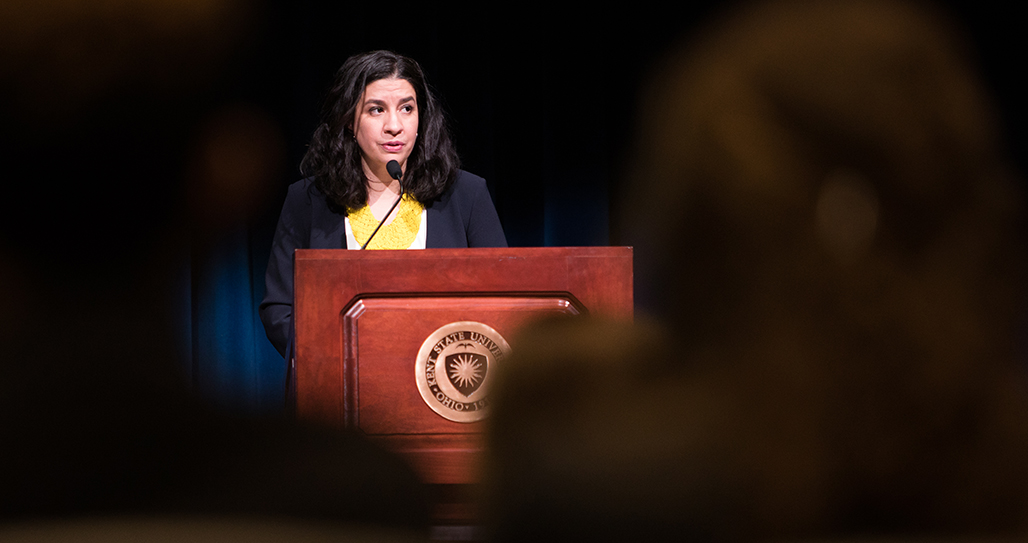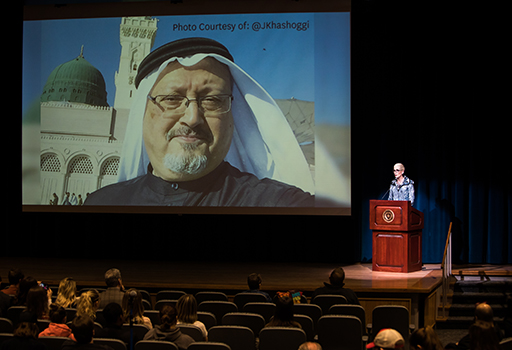¡Ω–‘…´ŒÁ“π University's School of Journalism and Mass Communication (JMC) honored two journalists at the 15th Annual Robert G. McGruder Lecture. Tanzina Vega, the host of National Public Radio's "The Takeaway" and Eisner Fellow at the Nation Institute, was honored with the Robert G. McGruder Distinguished Guest Lecture Award. Also honored at the event was deceased Washington Post reporter, Jamal Khashoggi, who was named the Global McGruder Award winner.
View a livestream of the lecture
Vega spoke to students about diversity and inclusion in reporting and discussed what gaps she sees in coverage and in behavior. She noted that the "wealth gap" often keeps reporters from investigating stories that exist at economic levels people are unaware of or uncomfortable covering. "There are so many stories waiting to be told," Vega said. "You don't need permission." She continued to list places where stories and real life diverge, talking about the "truth gap" and the "empathy gap."
"At 'The Takeaway,' we know good stories have long tails," Vega remarked. "We have to ask the questions. For example, what policies got us where we are today?" She noted that according to the , President Donald Trump told 7,645 demonstrable falsehoods in 2018. "We've gone from a truth gap to truth chasm to deficit, and at this point I think we're in a black hole."
Vega sees the ‘empathy gap’ as an opportunity for journalists of the future. "People want empathy to make change. ... By the year 2050, the majority of Americans will be of color and the majority of women. ... The good news about empathy is that it's all around us." Empathy can help get people out of their silos, she said, noting that even though social media and technology can connect us, that's not often the case. "Empathy," she went on, "comes from thinking, 'It's not about me.'"
Vega answered questions from students and faculty, highlighting how important local journalism is -- not only for informing readers about small level politics that directly affect them, but also as a training ground for journalists. Working the city council beat, for example, gives you the skills to navigate the larger political arena reported on by regional and national press outlets. "You learn how the city councils work, how people on the street feel about things," Vega pointed out.
Prior to Vega's talk, Professional-in-Residence Stephanie Danes Smith took the podium to honor deceased journalist, Jamal Khashoggi. "His opinion pieces in The Washington Post and other global outlets defended journalists and activists who 'dare to speak their minds,'" Smith said. "He championed the wrongfully imprisoned and the deliberately silenced -- especially journalists." In 2018, she told the crowd, of the 80 journalists killed worldwide, 49 (including Khashoggi) were targeted simply for being journalists. Smith then led the auditorium in a moment of silence.
Tanzania Vega has contributed to CNN, CNNMoney, WNYC Radio, Reuters television, Billboard magazine and The New York Times, where she won an Emmy Award for outstanding new approaches in documentary media and various awards from the National Press Photographers Association. NPR’s Code Switch called her one of their “Journalists — Of Color! — To Watch” and The Huffington Post listed Tanzina as one of the 40 top Latinos in American media. Jamal Khashoggi was editor-in-chief for Al Watan and contributed over the years to the Saudi Gazette, Okaz, Al Madina, Arab News and the Washington Post. Time magazine recognized him along with other journalists as their Person of the Year.
Robert G. McGruder was a trail-blazing ¡Ω–‘…´ŒÁ“π journalist who listed a number of ‚Äúfirsts‚Äù on his resume: first black editor of the Daily ¡Ω–‘…´ŒÁ“πr and first black reporter at The Plain Dealer both in 1963; first black president of the Associated Press Managing Editors group in 1995; and first black executive editor at the Detroit Free Press in 1996. He died in April 2002 at the age of 60.


